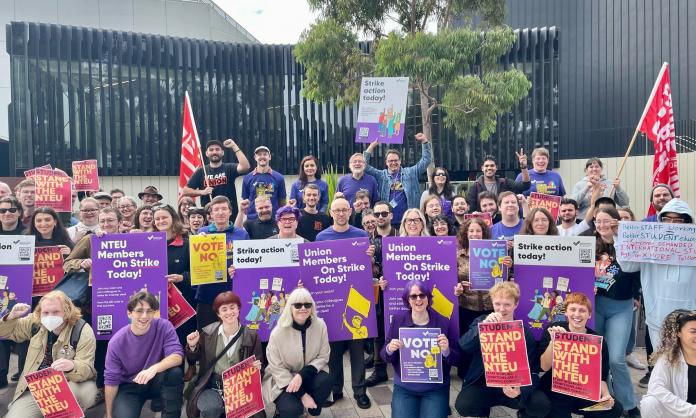Deakin University staff struck for the first time in a decade on Friday, 21 April. Around 50 workers rallied in the centre of Deakin’s Burwood campus, alongside student supporters. The strike was called with just four days’ notice in response to university management’s attempt to ram through an enterprise agreement that does not meet the demands of staff.
“Basically, what’s happened is management have decided to cast a non-union ballot. They want to proceed with the enterprise agreement but without the union involved, which is just spit in the face. The claims the union have asked for are based on conversations asking what staff want and trying to fight for it”, Josephine, a casual staff member and National Tertiary Education Union (NTEU) member, told Red Flag at the rally.
The deal that management have put to a staff vote doesn’t meet any of the union’s key demands. It provides a measly 2.85 percent pay rise, which would be a pay cut in real terms given that inflation sat at 7.8 percent in January, according to the Australian Bureau of Statistics. The deal includes the introduction of zero-hour contracts, meaning those who sign would not have any guaranteed hours. The ballot will be open for only four days—two of those fall within the Anzac Day long weekend, limiting the ability of the union to campaign against it. The union is running a postering campaign for staff to vote “no” on the ballot.
Although the strike was sparked by the non-union ballot, it follows a long attempt by workers to negotiate over demands including pay, workloads and casualisation. The NTEU currently has a case against Deakin management in the Fair Work Commission over wage theft from casual staff. They have been illegally underpaid for marking assignments through the use of piece rates instead of hourly rates.
“We actually get paid only one hour per student per semester, so for a thousand-word assignment, we get 15 minutes to mark it. That’s all we’re paid for, but of course, because we care about students, we often end up working more than that because we’re trying to give them something meaningful.”
Working conditions declined dramatically during the pandemic. Staff had to flip suddenly to online teaching with little support. In addition, the university introduced restructuring under the Orwellian name “Deakin Reimagined”. Staff estimate that hundreds lost their jobs as a result, especially casuals. During an unprecedented crisis, the work previously done by those who were let go was then redistributed to the already overworked staff.
“It was a real shock. It was really heart-wrenching, especially since it was done when we weren’t here on campus. A lot of people got swept away. The impact on morale has been huge”, said Josephine.
This all helps to explain why staff who have never previously taken industrial action joined the strike. The combination of the restructure, the ongoing attacks since the pandemic, the wage theft allegations and the cost-of-living crisis all laid the basis for this industrial campaign being more fiery than those of the past.
“This is the first time I’ve been on strike,” education faculty academic Rod Neilson told Red Flag after the rally.
“It’s good to have some solidarity, and I think what’s happened to my school means I have a right to feel angry. It’s been a very supportive and jolly atmosphere. I believe more in unions now.”










